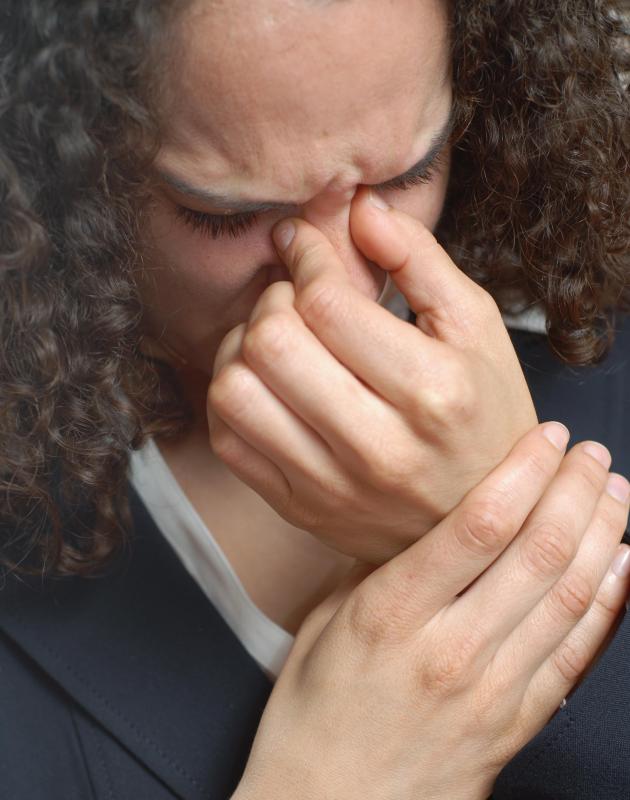At TheHealthBoard, we're committed to delivering accurate, trustworthy information. Our expert-authored content is rigorously fact-checked and sourced from credible authorities. Discover how we uphold the highest standards in providing you with reliable knowledge.
What is a Maxillary Sinus Infection?
Situated behind the cheek bones just above the teeth, maxillary sinuses drain into the nostrils through an opening in the sinus wall. When these sinuses become clogged and fill up with liquid that becomes infected, it is called a maxillary sinus infection. This is often characterized by symptoms such as pain, fever, congestion, and pressure under the eyes. If the sinusitis clears up in less than a month, it is considered acute sinusitis. However, if the condition lasts for more than two months, it is considered chronic sinusitis.
A maxillary sinus infection may be caused by a variety of factors, such as a viral infection, allergy, or tumor. Also, sinusitis may be brought on by an infection in the gums or teeth. An anatomical condition such as a deviated septum may also be the culprit for maxillary sinusitis. If the septum, the membrane that divides the nostrils, is not straight, it creates an obstruction in the nasal passage. This blockage causes poor ventilation, which prevents the sinuses from draining properly.

Having a maxillary sinus infection may be uncomfortable, as the areas around the cheekbone, eyes, and upper teeth will be sore. Cheeks also will appear red and swollen. A person will experience pain when keeping his head upright, but if he reclines, the pain will lessen. During a maxillary sinus infection, a person will often experience coughing at night, runny nose, and sometimes a toothache.

Treating a sinus infection revolves around lowering swelling, eliminating infection, and draining the sinuses. Swelling can be diminished with nasal and oral decongestants, which aid in clearing up nasal blockages. A nasal decongestant may work within a minute and an oral decongestant may take effect within 15 minutes. After extended use, however, decongestants become less efficient for treatment.

Antibiotics are also effective in treating sinus infections. Antibiotics lower the risk for chronic sinusitis and also deter complications from arising. Amoxicillin is one of the most common antibiotics prescribed to treat sinus infections. Methods to drain the sinuses include inhaling steam, or taking pain relievers or antihistamines. In cases where medication is ineffective, surgery may be required.

It is important to get treatment for a maxillary sinus infection. If no action is taken, complications can lead to severe medical conditions, even death. An individual should get medical treatment once pain or pressure in the face is followed by a runny nose. When a person suffers from personality changes, headaches, or seizures, it is an indication that the infection may have reached the brain.
AS FEATURED ON:
AS FEATURED ON:
















Discussion Comments
High doses of horseradish and Vitamin C eliminate this.
The first time I got a sinus infection I just thought I had a cold that lingered for a long time. Come to find out this was the first of many sinus infections I would have.
The best sinus treatment for me is taking antibiotics. The decongestants don't usually touch my symptoms and I get tired of feeling miserable all the time.
For someone who has never had a sinus infection it is hard to describe just how miserable they can be. It is like having a bad cold that just doesn't go away. Not only am I physically miserable, but also become very fatigued because I have a hard time sleeping.
My mom had a blocked sinus from a deviated septum and put up with this for many years before she decided to have surgery. I don't know how successful this surgery usually is, but I don't think she is that much better off since the surgery.
She still has problems with a runny nose and some of the other sinus infection symptoms she had before. They are not as bad as they were, but they have not totally gone away either.
I am fortunate that I don't have problems with allergies, and have only had one sinus infection in my life. This was a maxillary sinus infection with a dental origin. Basically I had an infection in my gums that turned into a sinus infection.
All of my teeth ached and I put up with this for about a week before I had it checked out. I kept thinking it would get better and go away on its own, but I don't think it would have ever cleared up without antibiotics.
The worst headaches I have ever had were when I had a sinus infection. I have had all the classic symptoms of a sinus infection and they can be absolutely miserable.
The cause of mine is allergy related and I am especially miserable in the spring and fall. I start out taking decongestants which work for awhile, but when they quit having an effect I head for the doctor and get a prescription for an antibiotic.
I just expect this for a few months out of the year and would love to find something that would treat the sinus infection without relying on medication.
Post your comments